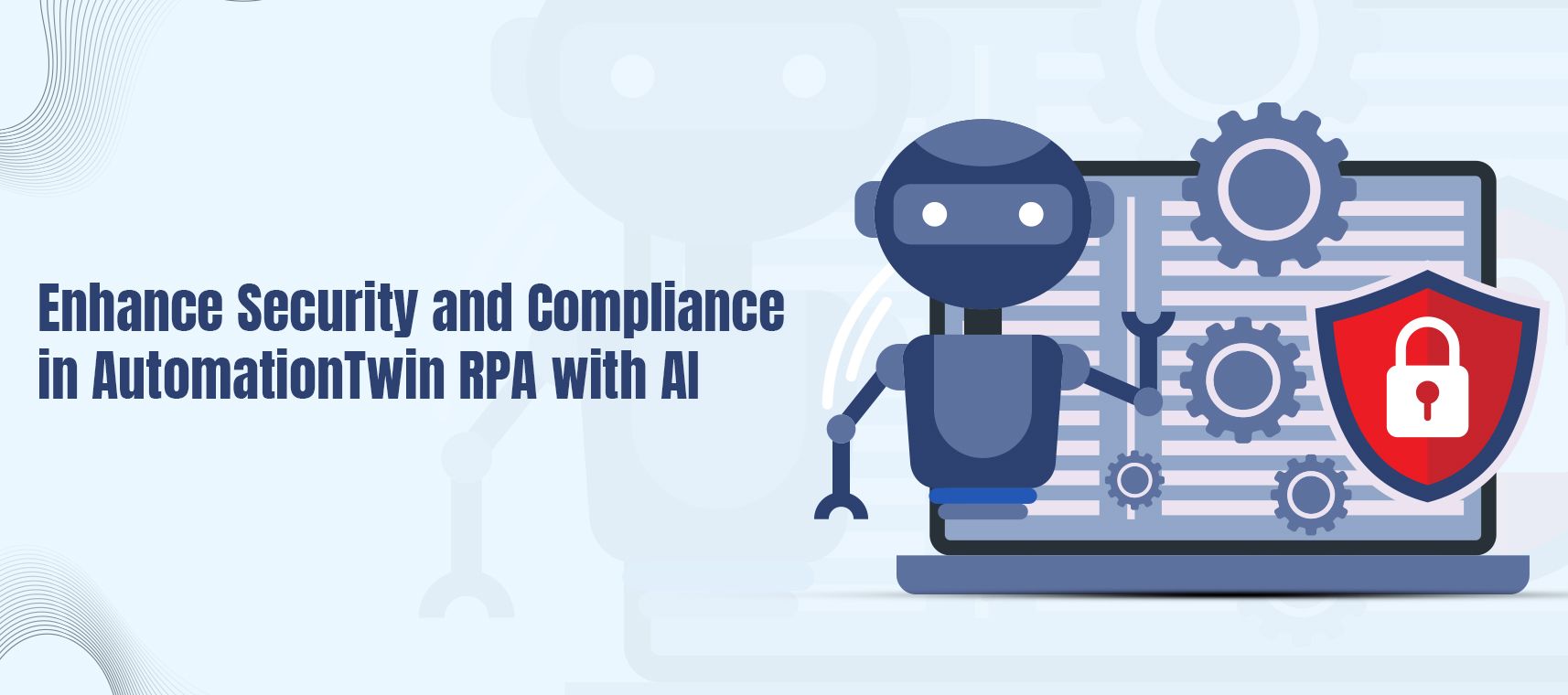
How AI can help in enhancing security and compliance in AutomationTwin RPA
Businesses are increasingly using robotic process automation (RPA) to improve efficiency and streamline operations in today’s environment. One prominent operator in this space is AutomationTwin RPA, which offers cutting-edge technologies that assist businesses in automating tedious jobs. Putting RPA into practice has its own set of security and regulatory issues.
Here, AI Software Development Company is a potent friend that may greatly improve RPA systems’ security and compliance. Let’s examine how AI can support AutomationTwin RPA’s security and compliance, guaranteeing strong security and compliance with legal requirements.
Understanding RPA and it’s Security Challenges
Sensitive data, including financial records, client information, and confidential company information, is frequently handled by RPA bots. Unmonitored or improperly configured RPA bots increase the likelihood that hackers will intercept your data and use it to steal or destroy sensitive information. The following 8 challenges prevent a secure RPA approach:
-
Unintentional exposure of data
Sensitive data, including financial records, client information, and confidential company information, is frequently handled by RPA bots. Unmonitored or improperly configured RPA bots increase the likelihood that hackers will intercept your data and use it to steal or destroy sensitive information.
-
Bot Impression
A unique identity for every bot is essential for security and to avoid bot impersonation. When two bots share the same identity, it can be challenging to identify which bot initiated a particular activity. Due to this lack of accountability, it becomes easier to trace potentially dangerous or unlawful behaviors.
-
Storage and administration of credentials
Login credentials are needed for bots to interact with other platforms. The way these credentials are stored, retrieved, and handled poses a security risk because any weakness in this process could allow for unauthorized access and data tampering.
-
Oversights in rapid implementation
Quickly deploying RPA could be so urgent that important security precautions are overlooked. For example, an AI Software Development Company using an RPA solution quickly to automate a manual process without first conducting a full security evaluation may result in unencrypted communication between the RPA bot and backend systems.
This preventable mistake leaves your RPA strategy open to hackers or other threat interception.
-
Reliance on external integrations
RPA systems frequently integrate with other third-party apps and systems. Relying on these integrations adds more risks if they are not sufficiently secured. For example, let’s say an RPA bot uses unauthorized external software to send data.
If the external party has security vulnerabilities or is compromised, the workflow could be disrupted, or the data could be changed.
Also Read: How to Enhance RPA Performance with AutomationTwin?
The Role of Artificial Intelligence Development Services in Enhancing Security
The following are the role of AI Development Services in enhancing security:
-
Threat Identification and Evaluation
AI systems can analyze enormous volumes of data, find patterns, and identify possible risks with a remarkable degree of accuracy by utilizing sophisticated machine learning algorithms. These systems can continually monitor network traffic, endpoint activities, and user behavior to spot anomalies or potential security breaches.
These systems’ scope extends beyond organized data alone. Additionally, they can use natural language processing techniques to examine and classify unstructured material, such as forums on the dark web and social media feeds, in order to identify new risks and harmful activity.
-
Behavioral analytics
AI is particularly good at behavioral analytics, which examines trends in network activity and user behavior. By setting up a baseline of typical activity, AI systems can identify abnormalities or departures from the norm that might point to a security risk.
This assists in detecting zero-day attacks and insider threats that conventional security procedures could overlook.
-
Automated Response to Occurrences
AI helps firms swiftly detect, evaluate, and respond to cybersecurity problems. It is essential to Automated Incident Response (AIR). Artificial intelligence (AI)–powered incident response systems are capable of independently analyzing vast amounts of security alerts, determining the seriousness of threats, and choosing the best course of action.
These systems may continuously learn from previous situations and modify their reaction techniques to increase efficacy and efficiency thanks to machine learning algorithms.
-
Extensive Data Interpretation
Massive volumes of data are produced by cybersecurity from a variety of sources, such as network traffic, user activity, and logs. Large-scale data handling and analysis are capabilities of AI that can be used to spot patterns and trends that could point to a security risk.
Big data processing skills are necessary for efficient cybersecurity in today’s networked and data-driven workplaces.
Useful Resources:
- Combining AutomationTwin RPA with AI, ML, and NLP to Enhance Automation Capabilities
- Future Trends in RPA and the Role of AutomationTwin
Recent Blogs
- Low-Code RPA: Empowering Citizen Developers Through Automation
- RPA Software Solution: Intelligent Document Processing with RPA
- RPA Software Solution: Transforming Business with Smarter Automation Tools
- Salesforce Implementation Services: Meet Your New AI Teammates
- Salesforce Services: How Modern Engineering Is Revolutionizing CRM Solutions
Categories
- Agritech (1)
- AR/VR (5)
- Artificial Intelligence (55)
- Machine Learning (1)
- Blockchain (4)
- Business Intelligence (3)
- CRM (5)
- SalesForce (4)
- Data Engineering (8)
- Data protection (2)
- Development (104)
- Golang Development (15)
- Python Web Development (9)
- React JS (5)
- React native (10)
- Devops (3)
- Hire Developers (3)
- Internet of Things (IoT) (5)
- Kubernetes (2)
- Machine Learning (2)
- Mobile App Development (44)
- Node.js (7)
- outsourcing (7)
- Partnership (4)
- Performance Testing (3)
- RPA (21)
- Security (24)
- Strategy (1)
- Testing (110)
- Accessibility Testing (2)
- Automation Testing (22)
- Dynamic Testing (1)
- Manual Testing (3)
- Mobile App Testing (13)
- Offshore Software Testing (6)
- Penetration Testing Services (13)
- QA testing (16)
- Remote Software Testing (7)
- Software Testing (19)
- Website Design (22)